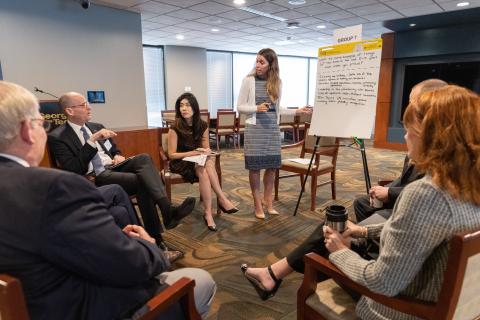
Faculty Governance, in collaboration with Student Engagement and Well-Being, invites all faculty to a panel discussion on academic freedom and freedom of expression. These freedoms are essential to scholarship, to learning and to democracy — and they are the focus of recent policies of the University System of Georgia. This panel will discuss what these concepts and these policies mean for Georgia Tech.
Dec. 4 at 4 p.m. – Virtual (Microsoft Teams) – Attend
Dec. 5 at 2 p.m. – In Person, John Lewis Student Center Piedmont Conference Room #1216, First Floor
Georgia Tech is a haven for intellectual exchange and academic freedom. We cherish inquiry and the innovative ideas that emerge from the intersection of diverse disciplines, backgrounds, and worldviews. While these interactions foster growth for our community, they can sometimes lead to conflict.
The USG BOR Policy 6.5 Freedom of Expression and Academic Freedom affirms the protection of academic freedom and freedom of expression. Policy 6.5.1 further expands on those essential protections.
The Georgia Tech Faculty endorses and defines academic freedom for our community as follows:
Freedom in the pursuit and expression of knowledge is fundamental to the life of the Institution. Academic freedom creates an environment in which faculty members may pursue their scholarly research, creative activities, publications, and teaching and related activities. It is essential to the university’s fulfillment of its mission to discover, produce, and communicate knowledge to students, to colleagues, and to the community at large. This mission depends upon the free search for truth and its free exposition.
These freedoms are a right and a responsibility. Faculty members are entitled to the guaranteed protections of academic freedom, regardless of their campus or branch affiliations, including international research and teaching activities. In safeguarding these rights for themselves and for others, faculty accept the responsibilities of participating in governance, fulfilling duties with intellectual honesty, and protecting the rights of others to learn, conduct research, and perform essential functions free from interference or obstruction. Faculty also commit to observing the policies outlined in the Faculty Handbook.
Panelists:
Robert Kirkman, Associate Professor, School of Public Policy
Hans Klein, Associate Professor, School of Public Policy
Luoluo Hong, Vice President for Student Engagement & Well-Being; Professor of the Practice, School of Psychology
Moderators:
Dima Nazzal, Chair of the Faculty Executive Board
Rhett Mayor, Secretary of the Faculty
